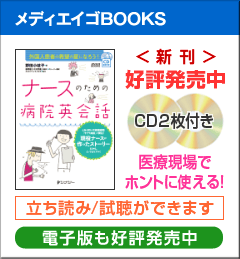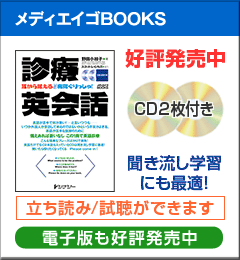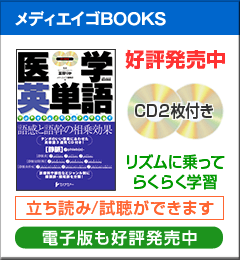

医学にも詳しいバイリンガル・パーソナリティのスマイリーが,ホットな話題を英語のニュースリリースを元に紹介する音声(ポッドキャスト)番組です。完全なネイティブではない,ちょっとくせのあるパワフル英語がやみつきになるかもしれませんよ。番組で取り上げるニュースリリースの全文も掲載しているので,ぜひご活用ください。
英語と日本語のチャンポンで不定期にお届けします。
Please enjoy this bilingual news program!
※iPhone, iPadでは「Download」をタップすると音声が出ます。
May. 14, 2012
No. 1
米国心臓病学会より:vorapaxarの心血管予防効果
新規抗血小板薬vorapaxarの追加で心血管イベントの二次予防効果が高まる
――ただし出血リスクは増大(TRA2P-TIMI50試験)
|
Get the Flash Player to see this player.
|
 |
・cardiovascular events:心血管イベント
・heart attack:心臓発作,心筋梗塞
・intracranial bleeding:脳内出血
【番組で取り上げた英文】
Adding vorapaxar, an investigational platelet blocker, to standard antiplatelet therapy significantly reduces the risk of recurrent cardiovascular events in patients with known atherosclerosis, a hardening and narrowing of the arteries.
When used with aspirin and other standard antiplatelet therapy in a broad group of patients with previous heart attack, stroke or peripheral arterial disease, vorapaxar reduced the risk of cardiovascular death, heart attack or stroke by an additional 13 percent (9.3 vs. 10.5 percent at three years, p<0.001).
This reduction in new cardiovascular events appeared greatest in patients with prior heart attack, among whom there was a 20 percent decline in these events (p<0.001).
The risk of intracranial bleeding was highest among patients who have suffered from previous strokes; vorapaxar would likely not be appropriate for stroke victims or patients at high risk of bleeding.
It’s exciting to find clearly that we can reduce the risk of a recurrent thrombotic event by adding another platelet inhibitor to aspirin over the long-term.
Of the groups we studied, the benefit was compelling to us only in patients with a prior heart attack.
【ニュースリリース全文】 ※番組で取り上げた箇所は太字になっています。
News Release from American College of Cardiology (CardioSource) on March 24, 2012
NEW CLASS OF PLATELET BLOCKERS PROVES EFFECTIVE IN PHASE III TRIAL
CHICAGO (March 24, 2012) — Adding vorapaxar, an investigational platelet blocker, to standard antiplatelet therapy significantly reduces the risk of recurrent cardiovascular events in patients with known atherosclerosis, a hardening and narrowing of the arteries, according to research presented today at the American College of Cardiology’s 61st Annual Scientific Session. The Scientific Session, the premier cardiovascular medical meeting, brings cardiovascular professionals together to further advances in the field.
Each year, more than a million Americans suffer a heart attack. For those who survive, doctors routinely prescribe aspirin therapy to help prevent blood clot formation in the arteries that can lead to another heart attack. Other platelet blockers, such as clopidogrel, are often added for as long as a year but it is unclear whether adding any platelet blocker to aspirin beyond this timeframe is useful. Despite such therapies, survivors of heart attack have an almost 15 percent chance of having another atherosclerosis-related event that brings them to the hospital within a year.
Now, researchers led by the TIMI Study Group at Brigham & Women's Hospital in Boston, Mass. have shown, for the first time, that adding a new antiplatelet agent on top of standard therapy, including aspirin, is effective for long-term secondary prevention in stable patients with a prior heart attack. When used with aspirin and other standard antiplatelet therapy in a broad group of patients with previous heart attack, stroke or peripheral arterial disease, vorapaxar reduced the risk of cardiovascular death, heart attack or stroke by an additional 13 percent (9.3 vs. 10.5 percent at three years, p<0.001). This reduction in new cardiovascular events appeared greatest in patients with prior heart attack, among whom there was a 20 percent decline in these events (p<0.001).
Vorapaxar is the first of a new class of investigational Protease Activated Receptor 1 (PAR-1) thrombin receptor antagonists. Unlike other antithrombotic drugs, vorapaxar blocks thrombin from stimulating platelets to stick together and create clots. Blood thinners, like coumadin, and other antiplatelets like aspirin or clopidogrel, do not directly target these same actions of thrombin.
“In the lab, we have seen very compelling science showing the importance of thrombin’s action on platelets causing blood clots in arteries,” said David A. Morrow, MD, MPH, senior investigator at the TIMI Study Group, director of the Samuel A. Levine Cardiac Unit at Brigham & Women’s Hospital, and the study’s lead investigator. “This is the first study to show definitively that blocking this pathway reduces the risk of suffering another cardiovascular event.”
This randomized, double blind, placebo-controlled, multinational study followed 26,449 patients for more than two years while receiving standard antiplatelet therapy for established atherosclerosis, including previous heart attack (n=17,779), stroke (n=4,883), or atherosclerotic narrowing in the arteries of the legs (n=3,787). Participants were randomly assigned to either take the investigational platelet blocker (2.5 mg orally once daily) with standard therapy, or a placebo with standard therapy.
“It’s exciting to find clearly that we can reduce the risk of a recurrent thrombotic event by adding another platelet inhibitor to aspirin over the long-term,” Dr. Morrow said. “Adding this new class of antiplatelet therapy reduced the risk of new cardiac events in stable patients, especially among the subset of patients with a prior heart attack.”
Dr. Morrow commented that if vorapaxar becomes available for clinical use, it does not appear suitable for everyone with atherosclerosis. “Of the groups we studied, the benefit was compelling to us only in patients with a prior heart attack,” said Dr. Morrow. In addition, this new therapy was found to increase the risk of severe bleeding, including intracranial bleeding. The risk of intracranial bleeding was highest among patients who have suffered from previous strokes; vorapaxar would likely not be appropriate for stroke victims or patients at high risk of bleeding. Stroke patients who were enrolled in the study ended their participation early after advice by the study’s data and safety monitoring board.
Patients who took vorapaxar had significantly more bleeding events (GUSTO moderate or severe bleeding at three years 4.2 percent with vorapaxar vs. 2.5 percent with placebo, p<0.001). Intracranial hemorrhage was higher with vorapaxar than placebo (1.0 vs. 0.5 percent, p<0.001) with lower overall rates in patients with no history of stroke (3 years: 0.6 percent with vorapaxar vs. 0.4 percent with placebo, p=0.049).
Dr. Morrow and his team look forward to learning more from this very rich dataset to identify the patients who may have the best balance of benefit vs. bleeding risk with this agent.
The study was funded by Merck Research Laboratories. Dr. Morrow has received research grant support and consulting fees from Merck and other manufacturers of antiplatelet and anticoagulant therapies.
This study will be simultaneously published in New England Journal of Medicine and will be released online at the time of presentation.



